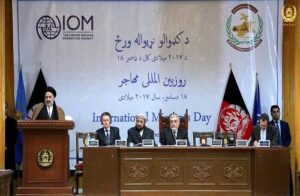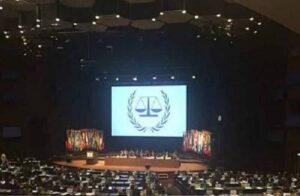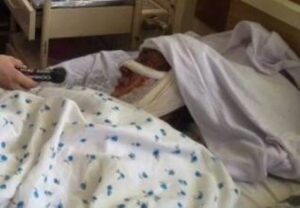
TALUQAN (SW) – Faced with crippling financial constraints in his family, Jawed, a young Takhar resident, opted for the desperate move to embark on irregular migration to Iran.
This resident of Taluqan city in Afghanistan’s Takhar province said he had heard troubling tale of the migration to Iran from others, but the desperate situation of his family compelled him to overlook that, and embark on the treacherous journey.
The human trafficker promised him a safe journey to Iran against certain amount of money.
He said this primary trafficker sold him to a Baluch trafficker in Iran who treated the migrants like animals. “From here to Nimroz, all the expenses were on us, and from there the traffickers took some 30 migrants to the border with Pakistan in a pick-up truck, and there onwards, up to 40 people are bundled-up in the vehicle like animals”.
On initial attempt, Jawed was caught by Pakistan’s border guards, and deported back to Afghanistan. After spending a night in Nimroz, he desperately opted for the second attempt. Jawed said the traffickers often physically abused the migrants and extort money from them.
Jawed said the Baluch traffickers sold 150 migrants including him to thieves who exploited them for bounded labor for a long time.
He said the traffickers demanded him to pay or transfer 1.5 million tuman in a week. Jawed said he paid up to 3 million tuman in 20 days to reach Tehran. But, joblessness caught him here as well, and he eventually thought about traveling further to Turkey. However, the traffickers kept him hostage for a month only to be deported back to Afghanistan. “The traffickers promise they would take the money in Ankara or Istanbul, but reality is not like that. By the time you reach Waam, they would take you to a sleeping place, and take all money from you by force and through physical abuse”, he said.
When he was deported back to Kabul, Jawed had no money left, not even enough to travel to Taluqan. His friends helped him with that.
Jawed now rides a taxi in Taluqan. He said many youngsters are still believing in the false promises and dreams of safe journey presented to them by traffickers.
Shafiq Poya, a local civil society activist in Taluqan told SW no rule of law combined with dearth of a clear mechanism to combat trafficking has led to many youngsters becoming victims of the traffickers. He suggested the traffickers should be identified and made to face justice. “The traffickers are roaming around every street to capture their prey, but the government is doing nothing to arrest them. If the government remained just as a witness, the situation would get worst”.
The National Referral Mechanism Mechanism (NRM) is a mechanism which is developed by the Afghan government’s High Commission to combat trafficking and smuggling. The purpose of this mechanism is to help government and NGOs to identify, refer, assist, and protect the VoTs and prosecute traffickers in a coordinated manner as outlined in the Afghanistan TiP Law 2017.
In the Article 6 the NRM to Help Victims of Trafficking in Human Beings and the Trafficking of Migrants, the following cases are listed as methods for identifying and following up on cases of victims of trafficking in human beings.
• Direct access to programs and support services by government and non-state employees in accordance with the provisions of the law
• Identification of victims of trafficking in human beings and trafficking of migrants via government departments based on written and verbal information or observation of attacks, tyranny and trafficking.
• Initial results of the discussion with victims of trafficking in human beings and trafficking of immigrants
• Monitor the behavior and appearance of the victim
• Information provided by the victim
• Discussion and analysis of the situation in which the victim is found
• Recruiting victims of human trafficking and trafficking of immigrants to relevant authorities
The provincial human rights commission, by expressing concerns over the migration of young people abroad, especially to Iran and Turkey, stated that according to the data, 15 to 20 percent of the young people in the northeast provinces annually leave the country.
Sayed Hafizullah Fitr, provincial head of the Kunduz Human Rights Office, said that fighting and insecurity, poverty and unemployment, and lack of a regular government program have led many young people to travel abroad. According to Mr. Fattaur, the government has no plans to prevent the escape of youth out of the country. According to him, the dream of a prosperous life abroad is taking even many trained young people to traffickers’ traps.
"Some of the aspirations that young people have in their hearts are thinking about their future, and thinking that they would go to Europe to live better life away from this war here”.
He said even a number of families encourage their youngsters to go abroad and immigrate. Mr. Fitrat said the police should act to identify and combat this serious phenomenon. According to him, there is still no record of the fight against human trafficking in the north-east of Afghanistan, and this situation is "worrying."
ENDS





